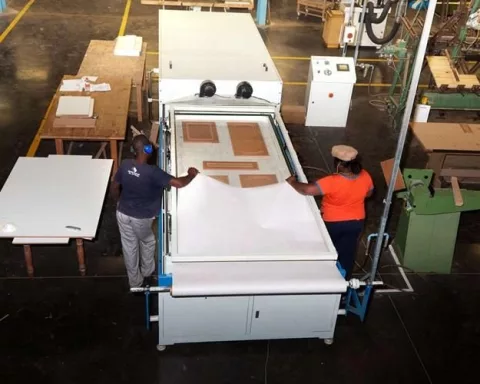South Africa’s Minister of Higher Education and Training, Dr. Blade Nzimande, has released groundbreaking research reports as part of the Labour Market Intelligence Programme (LMI). The reports reveal skills necessary for economic growth and highlight high demand occupations, occupational shortages, and skills deficits. The LMI program is inclusive and encourages stakeholder participation, and its extensive scope reaches beyond the Department of Higher Education and Training or the Post-School Education and Training System. The program’s research initiatives bridge the skills gap and nurture a skilled workforce, contributing to the future growth of South Africa’s economy.
Labour Market Intelligence Programme (LMI) research reports unveil skills necessary for economic growth. Spearheaded by South Africa’s Minister of Higher Education and Training, Dr. Blade Nzimande, the LMI program has generated an abundance of research studies. The reports highlight the occupations experiencing high demand, pinpoint occupational shortages, and identify deficits in foundational, technical, and soft skills, among other things. Furthermore, the LMI program fosters inclusivity and encourages stakeholder participation, enhancing the value of the research findings.
Labour Market Intelligence Programme: A Beacon of Foresight
In a grand assembly that stirred the academic and business spheres, Dr. Blade Nzimande, the Minister of Higher Education and Training, ushered in the release of pivotal Labour Market Intelligence (LMI) research reports on skills necessary for economic growth. The gathering held immense significance, showcasing the synergy of collective efforts to enhance data collection, analytical prowess, and system-level cohesion within the South African labour market.
Circling back to 2012, Dr. Nzimande spearheaded a long-term research venture, the Labour Market Intelligence Programme. With its goal of creating a trustworthy institutional process for skills planning, the programme played a crucial role in propelling a forward-thinking skills development strategy, firmly rooted in evidence-driven research. Supported by the National Skills Fund, the LMI research programme has made substantial progress in mitigating skills discrepancies and other forms of incongruence in the labour market.
In 2019, the second phase of the LMI research programme commenced, marking another significant milestone. Collaboratively carried out with the Development Policy Research Unit of the University of Cape Town, this phase is set to reach completion in June 2025.
The Impact and Influence of the LMI Research Programme
Over the past ten years, the LMI research programme has generated an abundance of research studies. These studies range from research reports and academic papers to policy briefs, templates, tools, and theoretical definitions. The research reports, accessible on the LMI website, serve as a linchpin in comprehending the dynamics of skills supply and demand in the South African labour market.
Among the reports presented by Dr. Nzimande, the List of Occupations in High Demand holds notable importance. Created to assist enrolment planning, resource prioritisation, career information dissemination, and qualifications development, this list highlights the occupations experiencing high demand in South Africa. Additionally, the report on the Critical Skills List pinpoints occupational shortages and provides guidance to the Department of Home Affairs regarding its Critical Skills Visa policy.
Furthermore, the Skills Gaps report identifies deficits in foundational, technical, and soft skills in the labour market. The Skills Supply and Demand report detects incongruities between qualifications and occupations. Simultaneously, the Master Skills Plan underscores critical problems that need tackling to ensure South Africa possesses the requisite skills for societal and economic advancement.
The LMI Research Programme: A Nationwide Initiative
The LMI research programme receives widespread acclaim for its extensive scope, reaching beyond the Department of Higher Education and Training or the Post-School Education and Training System. As a nationwide research programme, it caters to all South Africans, spanning from government departments to media outlets. The programme fosters inclusivity and encourages stakeholder participation, enhancing the value of the research findings.
A recent intriguing project taken up by the LMI involved the identification of skills necessary for the hydrogen economy. The hydrogen economy is projected to significantly grow in South Africa, with R319 million already allocated from the R1.4 trillion Just Energy Transition investment plan for this sector. In a proactive step, the LMI research programme initiated a skills needs assessment to pinpoint the skills required across the entire green hydrogen value chain.
This hydrogen project identified 138 occupations within the value chain, but it also discovered that these currently lack hydrogen-specific capabilities and need enhancement to fill the gaps. The report proposes a series of interventions to train the trainers, inclusive of assessing opportunities for workplace-based learning in South Africa and abroad for green hydrogen-related work.
Future Plans and Initiatives of the LMI Research Programme
Besides these, the launch also featured the third version of the Post-School Education and Training Monitor Report, which offers a broad overview of macro trends in the South African PSET system. This report uses high-level quantitative indicators to track progress in key areas of the post-school education and training system. It provides valuable insights into the progress of the South African post-school education and training system in comparison to other countries.
Dr. Nzimande also outlined plans to conduct a research study on the supply and demand of health professionals, in collaboration with the Department of Health and other sector-specific authorities. This move comes in response to evolving skills shortages in the health sector.
Highlighting these extensive research initiatives, Dr. Nzimande emphasised that the third phase of the LMI research programme, set to start in July 2025, will concentrate on using research findings to inform decision-making. He stressed that Labour Market Intelligence empowers both government and businesses to efficiently address the human resources development needs of the country.
Amidst a shifting economic landscape and burgeoning sectors, the LMI research programme embodies foresight and planning. Its endeavour to bridge the skills gap and its dedication to nurturing a skilled workforce are admirable. As we look forward to more years of insightful research, we also anticipate the bright future of South Africa’s economy.
What is the Labour Market Intelligence Programme (LMI)?
The Labour Market Intelligence Programme (LMI) is a research initiative spearheaded by South Africa’s Minister of Higher Education and Training, Dr. Blade Nzimande. The program aims to identify skills necessary for economic growth, highlighting high demand occupations, occupational shortages, and skills deficits.
What reports have been released by the LMI?
The LMI has generated an abundance of research studies, including research reports, academic papers, policy briefs, templates, tools, and theoretical definitions. Notable reports released by Dr. Nzimande include the List of Occupations in High Demand, the Critical Skills List, and the Skills Gaps report.
What is the impact of the LMI research programme?
The LMI research programme has contributed to closing the skills gap in the South African labour market by identifying skills necessary for economic growth and highlighting occupational shortages. The research reports serve as a linchpin in comprehending the dynamics of skills supply and demand in the South African labour market.
What is the scope of the LMI research programme?
The LMI research programme has an extensive scope, reaching beyond the Department of Higher Education and Training or the Post-School Education and Training System. The programme fosters inclusivity and encourages stakeholder participation, enhancing the value of the research findings. The hydrogen project is an example of the LMI’s proactive approach to identifying skills necessary for emerging sectors.
What are the future plans and initiatives of the LMI research programme?
Dr. Nzimande outlined plans to conduct a research study on the supply and demand of health professionals, in collaboration with the Department of Health and other sector-specific authorities. The third phase of the LMI research programme, set to start in July 2025, will focus on using research findings to inform decision-making and address the human resources development needs of the country.
How does the LMI research programme contribute to the growth of the South African economy?
The LMI research programme identifies skills necessary for economic growth, highlights occupational shortages, and provides guidance to the Department of Home Affairs regarding its Critical Skills Visa policy. By bridging the skills gap and nurturing a skilled workforce, the LMI research programme contributes to the future growth of South Africa’s economy.












